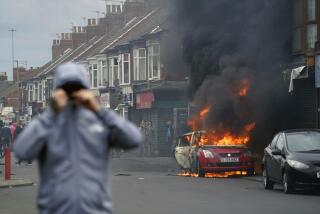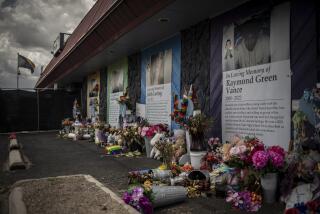Radicals Say They Attacked Whites’ Club : South Africa: Armed wing of black group refusing to join talks claims responsibility for 4 deaths.
JOHANNESBURG, South Africa — The armed wing of a radical black group still committed to guerrilla war against the white-minority government claimed responsibility Monday for the gun and hand-grenade attack on a crowded country-club dining room that killed four whites over the weekend.
A man identifying himself as a soldier with the Azanian People’s Liberation Army, or APLA, telephoned police in East London on Monday to say his group’s regional wing staged the attack, police Lt. Col. Christo Louw said.
APLA is the military wing of the Pan-Africanist Congress, a left-wing black group and rival of Nelson Mandela’s African National Congress. Like the ANC, the PAC fought a 30-year guerrilla war against Pretoria. But the PAC has refused to suspend its guerrilla war or enter multi-party negotiations over the country’s future.
The attack, the most deadly of its kind against white civilians in a public place, deeply frightened many whites here and gave a temporary boost to right-wing whites opposed to President Frederik W. de Klerk’s reforms. But it is unlikely to scuttle negotiations between the ANC and the government.
In fact, the country-club attack, like the nearly 6,000 unsolved, politically motivated killings in the last three years, renewed calls from all the major black and white leaders for even more rapid progress to a political settlement.
The slayings brought to 43 the number of political killings in South Africa over the weekend. Most of the victims were black, but the rare attack on whites grabbed the headlines in white-run newspapers across the country.
The ANC called the country-club attack “an outrageous act of naked terrorism . . . committed against unarmed and defenseless people.” Such violence, it added, “only serves the interest of those who are trying to derail the negotiation process through violence.”
Police offered a 50,000-rand reward, about $17,000, for information leading to the arrest and conviction of the killers, who remained at large Monday.
Pan-Africanist Congress leaders said they could neither confirm nor deny a role in the Saturday night assault on the King William’s Town country club. Five black gunmen, armed with automatic weapons and hand grenades, opened fire on whites attending a Christmas dinner sponsored by a wine-tasting group.
Benny Alexander, the rebel group’s general secretary, declined to either confirm or deny PAC involvement in the incident, noting that political and military wings operate separately. But he said it was uncommon for cadres of the Azanian People’s Liberation Army to attack civilians or to claim responsibility in phone calls to the police. Ordinarily, they phone the news media and identify themselves by their army nicknames, he said.
But police said they already had suspected the PAC’s military wing because a number of unexploded gasoline bombs found at the scene were similar to those used previously by the Azanian army.
Alexander acknowledged that many PAC supporters believe political violence in the country, which has mainly affected blacks, would be treated more seriously by the government if it spills over into white areas. “There is a lot of international hullabaloo around the attack purely because white people have died,” Alexander said.
In recent weeks, Pan-Africanist Congress leaders have launched one-on-one talks with De Klerk’s government. But PAC supporters, among the most militant in South Africa, often chant “one settler, one bullet,” a reference to the white Afrikaner settlers.
At a PAC rally in Cape Town on Sunday, Patricia de Lille, a member of the group’s national executive committee, accused the ANC of “selling out our country” by agreeing to negotiate the future with De Klerk’s government.
“There can be no talk about suspending or ending the armed struggle,” she said. Other speakers, calling their organization “the custodian of the African people’s democratic ideals,” reiterated their opposition to any form of power-sharing with the government.
More to Read
Sign up for Essential California
The most important California stories and recommendations in your inbox every morning.
You may occasionally receive promotional content from the Los Angeles Times.











